Interview
Interview: Meera Palia
In conversation with London based abstract artist Meera Palia.
Can you talk about your journey into or interest the arts?
I came to painting later in life – when I turned 30 – so I hadn’t picked up a paint brush since secondary school. It was immediately clear to me that I wanted to try abstract painting which felt much more accessible and interesting to me so I did an introductory course once a week for a term at Morley College London in South London and fell in love with it straight away. It remained a hobby that I would sporadically engage with for a decade or so alongside a career in education and I have done several inspiring short courses in London Adult Education colleges over the years (City Lit, Mary Ward Centre, Central Saint Martins summer school). I took a sabbatical from my job teaching A-level Sociology recently and I rented a studio to give painting more attention. Then I became obsessed and there was no going back!
Can you talk about the influences upon your work?
I have always loved abstract expressionist painters and am very inspired by artists like Joan Mitchell, Lee Krasner and Per Kirkeby to name just a few favourites. I am always searching for spontaneity, authenticity and energy in mark-making and I love the physical act of painting, flicking, scratching, smudging etc. I think my work is very influenced by my love of music and dance too – particularly those forms of spontaneous improvised performance.
I have enjoyed learning Flamenco dance and jazz piano over the years and I have said elsewhere in artist statements that I am always aiming for the painting equivalent of the jazz jam and the flamenco improvisation rather than a polished choreography. I paint to music too and am fascinated by interesting rhythms so I think this sometimes comes across in my marks. Other influences are interesting textures in nature, the beauty of decaying buildings (I love peeling paint/wallpaper etc.) and the vibrancy of street art.
You describe your work as being improvised and unplanned. I’m really interested in this and it is something I’ve looked at in my own practice. I guess planning can suppress a project before it is even started, but as humans, it is in our nature to pre-empt, to predict. How do you balance these two opposing forces?
Yes, I agree. It is not easy for us to completely embrace the present and act spontaneously but painting feels like one area of life where I really can do that – it depends far less on what the rest of the world is up to! So there doesn’t feel a tension to overcome in that context for me personally – the experimental improvisation is the main reason why I love it so much so I expect that if I stopped painting that way, then I might stop entirely.
I have to treat each piece as a unique event. That is not to say that I don’t have some ideas that I keep in me or even note down for the future. But they will only find their way into my work if and when the time is right. And there are ideas or technical revelations that will emerge in one piece that then become part of my visual and gestural language and find their way into others. In the same way that a jazz pianist’s improvisation will draw on a repertoire of musical phrases that have evolved from previous improvisations, as well as a learnt vocabulary, and these may then naturally become their ‘signature’ sounds.
I know many people find it very difficult to not have an end point in mind and it is true that when you paint this way it is perhaps even more difficult to know when to stop which can be frustrating. But it is also really liberating to know that you can continuously reinvent, to be reminded that there can be many outcomes. You can end up feeling much more empowered not having executed a plan! It’s quite a profound lesson to learn on a micro scale.
You have to accept making many things that look rubbish along the way too. And I don’t mind that because I love tearing things up and reusing my rejected ‘scraps’ as collage elements later so nothing feels wasted or a ‘mistake’, that horrible word that sadly strikes terror into too many of us and prevents genuine exploration and learning.
You are in part self taught in the arts. Do you still utilise your area of original study, philosophy and sociology?
Not in any conscious way. In part, I think I was attracted to abstract expressionism because I craved a break from busy, over-analytical thought processes and grey areas, and I wanted to indulge the more intuitive, emotional side of me. But I think in a less obvious way, all the things that led me to an interest in social science/philosophy are perhaps inevitably still present in my work – seeing painting as an enquiry, hesitance and searching with my materials and tools, exposing areas of uncertainty, embracing complexity with a desire to find connections, new perspectives and order in mayhem and so on! I also think there is a tendency for me to seek out and find figures in the mess of marks that I have made!
As a self-taught emerging artist, in the beginning there are so many practical things you have to learn at a basic level about being an art ‘business’ as well as all the technical skills and knowledge you are developing but I really do hope to make more time for reading and thinking more about the art world in sociological and philosophical terms.
I think my background definitely means I am fascinated by the art world’s institutions, hierarchies and subcultures and there will no doubt be a lot to learn and challenge along the way. But for now I remain focused on just making the art and reaching people who might want it!
Can you talk about your process of working. How do you work, how often, is there a particular pattern?
I paint in short bursts. Mostly with acrylics and oil pastel and my default is to work on A1 size paper. I have had a long absence from studio work since last December so it is hard to say exactly how things will unfold in my new studio. But based on my last experience of having studio space, I would say I probably paint for just a few hours in a day.
I spend a lot of time just looking at work and thinking about it after the initial experimental spontaneous stage is over. So I often have many pieces on the go and like to get some distance from them, returning with fresh eyes to help me see what is needed, if anything, for it to feel complete. If I feel stuck, I may turn to my old ‘scraps’ of torn up work and introduce some collage elements to help take things in a different direction.
I also turn the paper or canvas regularly too, working on it in different orientations and as a result they often have enough overall balance to have more than one hanging position depending on the viewer’s preferences. Taking photos of work and observing these away from the studio to help get some perspective is also useful but also a bit dangerous as there is no real break from analysis!
Do you find the process of creating work relaxing or therapeutic? I’ve become increasingly interested in the relationship of the artist to their working patterns and environment.
Yes, I do find certainly the initial stages of painting relaxing. And particularly when I am lost in my playlist and just enjoying the spontaneous physical movements of my hands, playing around with different marks. Certain types of marks will feel more meditative than others – I love painting long light winding lines whilst slowly twisting a thin brush in my hand. And other marks enable a real release in emotions – scribbling dramatically, with paints or oil pastels is always very freeing and satisfying for me! So yes, there is a therapeutic dimension.
However, the later stages of a painting can be very stressful or frustrating if I am unclear on when or how to finish it. That’s when I need to leave it alone and start something new. For me, I’ve realised that having a separate room or space just for painting also feels necessary. This isn’t possible at home and I did not work well at the kitchen table during lockdown – partly due to the fact I couldn’t paint on a larger scale, but also because I have always needed some boundaries/separation of home/work life.
Painting is escapism to me, an activity that is about being present in the moment in a way that can feel very difficult in other areas of life so I wasn’t good at maintaining a relaxed focus amongst dishes building up around me or my partner inevitably wandering into the kitchen for a sandwich!

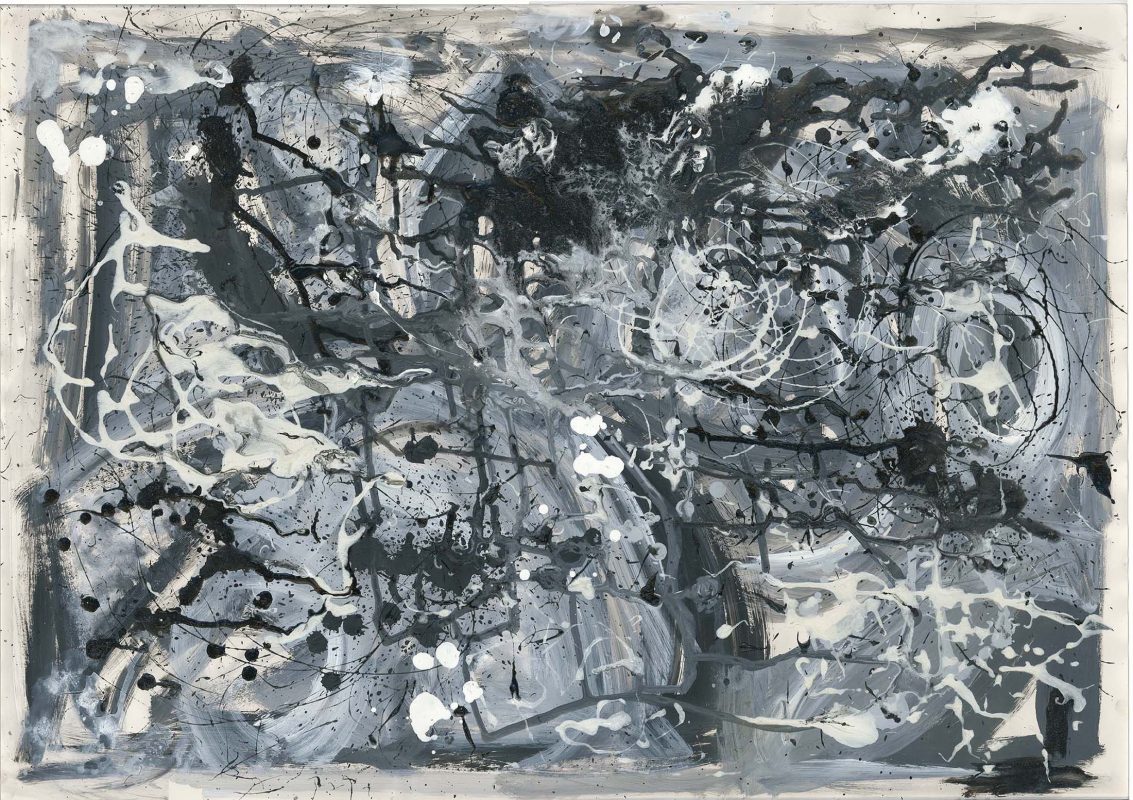
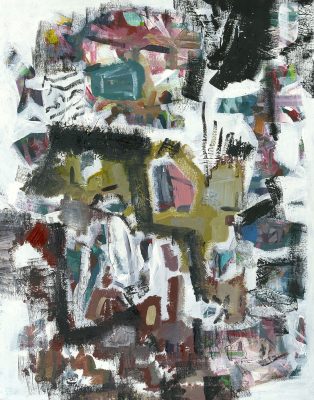
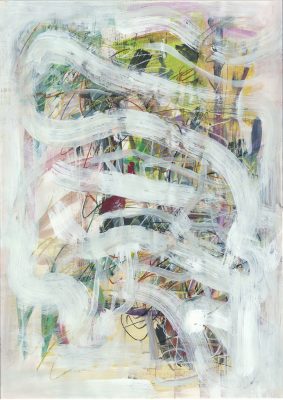
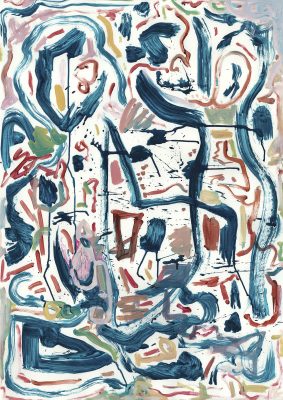
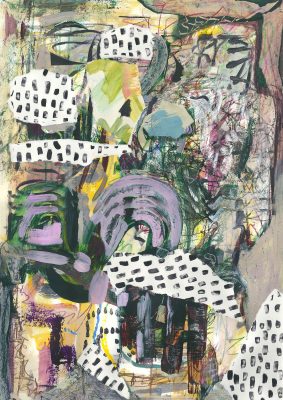
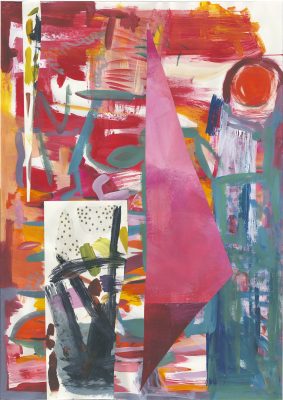
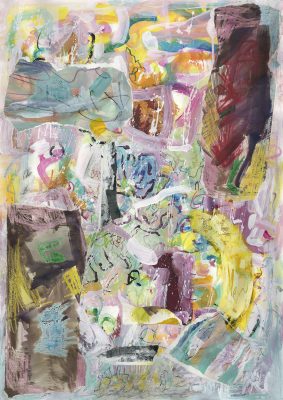
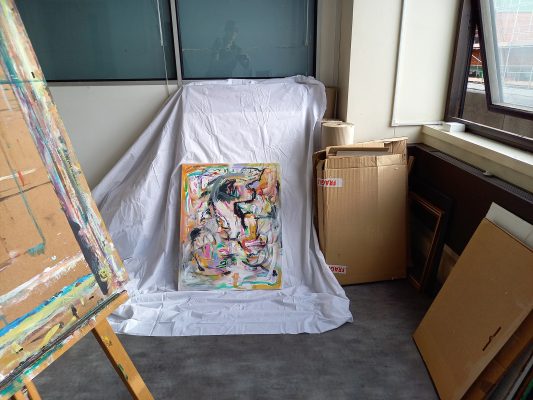
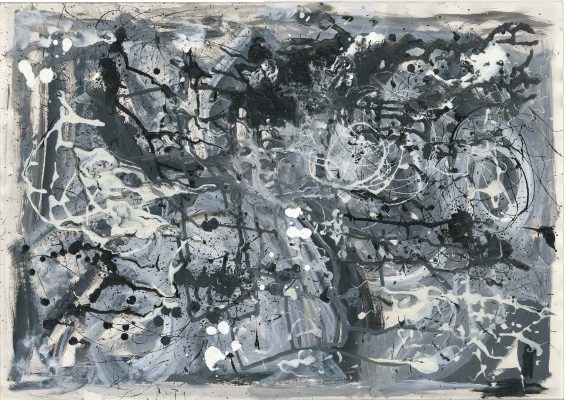
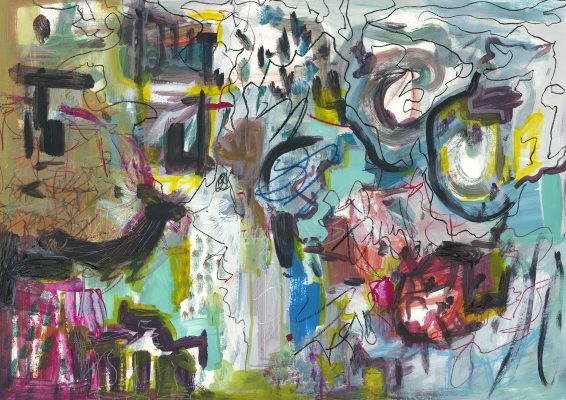
Do you like this artist?
If so, why not write a comment or share it to your social media. Thanks in advance if you can help in this way.